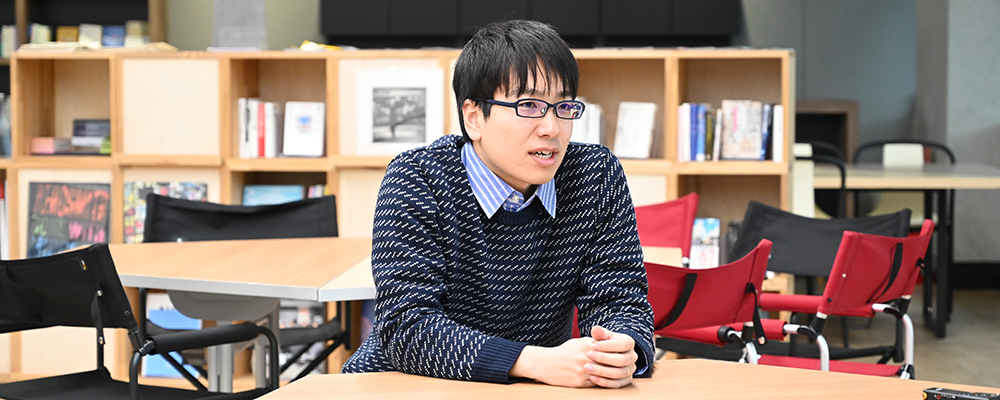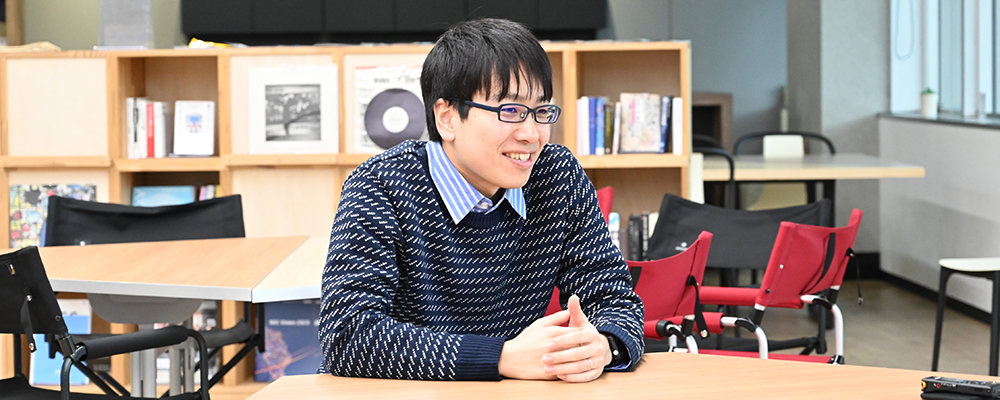Global Site
Breadcrumb navigation
Internship Experience Interview Report: Junya Ikemoto
April 3, 2024
Experiencing Corporate Research in a University-like Atmosphere

Researcher, Data Science Research Laboratories
Junya Ikemoto
Ikemoto joined NEC after completing his doctorate program in 2023. During his student days, Ikemoto researched deep reinforcement learning-based nonlinear control, but after joining the company, he has been engaged in researching optimization technologies from both application and foundational aspects such as the dynamic optimization of chemical plant operation support and the theoretical analysis of online optimization.
Participating in an internship for roughly one and a half months remotely from Osaka
I participated in an NEC internship during the second year of my doctorate program. I was feeling a bit stuck due to a lack of originality in my own research and wanted to try studying something else, so I started looking for company internships. At the time, I was not absolutely set on going into academia after completing my doctorate program, and I thought that I would be unable to decide whether to continue in academia or join a company without at least trying corporate research once in an internship. When I searched for information about corporate research and development on the Internet, I discovered that NEC was ranked quite high in terms of the number of corporate research papers, so I thought that I might be able to effectively balance my activities as a researcher and as a businessman at NEC, applied for the internship, and decided to join the program.
Up until then, I had been researching nonlinear control and was working on how to apply deep reinforcement learning to this field, and the internship was with the team researching online optimization, which is one of NEC's core technologies. Therefore, I approached the research by examining how online optimization could be applied to the control technologies that I had been working on. I was hired as a Special Researcher for the Japan Society for the Promotion of Science, so in order to participate in a paid internship, the work had to be related to my own research, which is part of the reason why I applied.
Incidentally, I was living in Osaka at the time, so I only visited the research laboratory at the NEC Tamagawa Office during the first and last weeks and worked remotely from Osaka for the remaining one month. The company pays for my lodging expenses when working at the research laboratory.
Ability to set your own theme and conduct research freely

Because the team that I joined was recruiting people who could take the initiative and operate on their own and you were allowed to bring in your own research theme, I was able to incorporate my own research into the internship.
The program was structured such that you choose a theme and then think about it on your own. Initially, I was given several guidelines and allowed to proceed freely within those guidelines before finally giving a roughly 45 minutes slide presentation at the Data Science Research Laboratories presentation meeting (Note 1). Ultimately, it is similar to how university research is carried out by submitting a master's thesis and a doctoral thesis. In addition to weekly reports and chats, and status reports in meetings with my supervisor roughly twice a week, I was able to proceed with my research while managing the process on my own. For that reason, I think that I was able to comfortably work remotely from Osaka.
Before participating in the internship, I thought that when you became a company intern, the program would be similar to engineering in which you single-mindedly do the tasks that are assigned to you, but my first impression is that an NEC internship is a lot like being at a university. So, it may be similar to a situation in which you can have two research accounts while remaining a student. It was fun to be able to conduct both my student and intern research in parallel. In addition, I was able to create new sources to draw on in my own research by learning about optimization technologies. I think that an NEC internship is an environment where you can learn in that way and have fun.
Moreover, if something comes up that you must take care of due to circumstances at the university, you can rearrange the work schedule or take a day off from the internship by consulting with the company in advance. I think that one of the key points is that it is easy to balance the internship with university activities, which enables you to participate with peace of mind.
- Note 1:The work carried out by interns differs according to the theme.

An introduction to Ikemoto's daily schedule during his internship
- 8:30
-
Remote work due to COVID-19 (from Osaka)
Check email and Teams
Start by organizing the work to be done today.
Conduct a research survey (broad and shallow) during the morning. Carry out basic studies of online optimization in parallel. - 12:00
-
Have lunch at home or eat with fellow students if he has time
- 13:00
-
Dig deeply into one research paper that he would like to use as a theme. Perform manual calculation and simulation.
- 15:00
-
Meeting with his supervisor (twice a week): explain what he has been investigating. Ask questions about areas of non-expertise.
- 16:00
-
Summarize the meeting results, what he learned, and his thoughts
- 17:15
-
Leave work
Break - 18:00
-
Due to a different theme, properly conduct his research as a graduate student
Gaining experience that can also be applied to activities in academia
The academic atmosphere remains unchanged not only during the internship but even after I joined the company. I think this is the unique culture of NEC. You can conduct applied research like a company and basic research similar to academia. I think that the ability to have the best of both worlds is the most appealing aspect of NEC. In fact, I am currently conducting research aimed at application to a chemical plant and basic research on online optimization technologies at the same time. In applied research, I am building a system that can be used in large-scale plants while collaborating with the National Institute of Advanced Industrial Science and Technology while in basic research on online optimization, I am able to conduct research under Mr. Ito (URL: https://jpn.nec.com/rd/people/shinji_ito.html), a researcher who submits several research papers to top conferences every year. I sincerely hope that other students will also experience this kind of atmosphere through an NEC internship.
It is okay if you do not necessarily plan on joining NEC, but I would especially recommend that people in doctorate programs participate in an internship. I feel that the greatest thing about participating in an internship is that it eliminated my anxiety about the future. I think that many students in doctorate programs are worried about their own future. To begin with, compared to undergraduate and master's students, the timing and the details are not very clear when it comes to job hunting for doctoral students. Just participating in an internship one time will make what was previously blurry become visible. It will serve as an opportunity to learn about the research and selection process within the company as well as how to get hired, and that alone will become a major advantage.
Moreover, even if you decide to go on to academia, knowing about specific applications will be a great benefit. For example, it has become significantly easier for me to fill in the practical application and application image sections of research grant application documents. Thanks to my internship, it has become possible for me to concretely visualize how the basic technologies that I am researching can be applied and in which industries. I think that alone will prove to be a valuable experience.

- ※The information posted on this website is the information at the time of publication.
